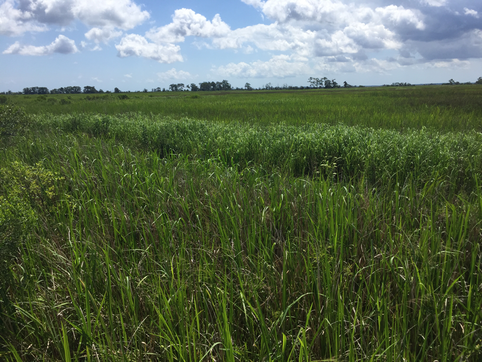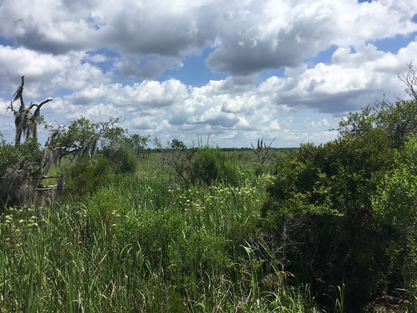 The Rice Bog at Hofwyl-Broadfield The Rice Bog at Hofwyl-Broadfield Sam Burnham, Curator The coast of Georgia winds and curves. The barrier islands, rivers, marshes, sounds, and hammocks form a texture. It’s a nooks and crannies kind of place and if you look in these spaces you’re bound to find something unique. One such place can be found clinging to the marshy bank of the Altamaha River, down on US 17 between Darien and Brunswick. The Hofwyl-Broadfield Plantation State Historic Site tells several stories, including this one. Plantations like this one were different than plantations in the interior. Here is where we find the foundation of a culture that itself now clings to the Georgia Coast, the remnant of what once was.  The Rice Bog at Hofwyl-Broadfield The Rice Bog at Hofwyl-Broadfield When we think of Georgia agriculture during the antebellum era, we think about cotton and maybe tobacco. But along the coast the crop was rice. Rice is a specialized crop and the slaves brought to the low country to produce it had skills that were brought from rice growing regions in West Africa. These slaves also brought another important trait for rice cultivation - a genetically encoded immunity to the most severe effects of malaria. This immunity opened the door for the birth of the Geechee culture in Georgia. While the low country slaves did suffer from some symptoms of malaria, the disease made surviving the summer on a rice plantation practically impossible for white landowners. For six months out of the year, rice plantations were completely isolated enclaves of West African slaves. From overseers down to the basic laborers lived, ate, worked, and entertained themselves with minimal influence from outsiders. The result was the development of a creole culture. Language, music, art, clothing, and folklore were all passed from one generation to the next. These traditions didn’t stray far from their African roots. In fact, a ranger tells the story of a group of Geechee people who travelled to Sierra Leone. A young girl from Georgia began singing a Geechee song for her hosts and before she finished, a child of her hosts was singing with her. They both knew the song well. An ocean of distance and two centuries of time had not destroyed that link. Today the culture of the Gullah/Geechee people is threatened. What used to stretch from the Outer Banks of North Carolina to Northern Florida is now confined to a few barrier islands in Georgia and South Carolina. The end of isolation, the encroachment of modernism, economic pressures, and time are all slowly robbing us of this culture. People move away to find a living, people grow old, they die. Factors such as development and “progress” have all but wiped out the Gullah/Geechee people. Survival of the culture now depends on people who work to keep songs, stories, dialect, and clothing traditions alive. Soon a culture that we know today, that still exists on our coast, will need to be portrayed by living historians as it will die while we watch. Gullah/Geechee culture is being preserved in places like Hofwyl-Broadfield. The Gullah/Geechee Ring Shouters of Darien perform the traditional songs and dances. Researchers like Dr. Griffin Watson document and demonstrate the creole dialect. It seems like these scenarios are the best we can hope for. As the stories survive and people continue to care for the traditions, something of the Gullah/Geechee will survive. That will never be the same as having the culture living and breathing but unless something changes really soon, that’s all we can expect.
0 Comments
Leave a Reply. |
Sam B.Historian, self-proclaimed gentleman, agrarian-at-heart, & curator extraordinaire Social MediaCategories
All
Archives
November 2022
|




 RSS Feed
RSS Feed
